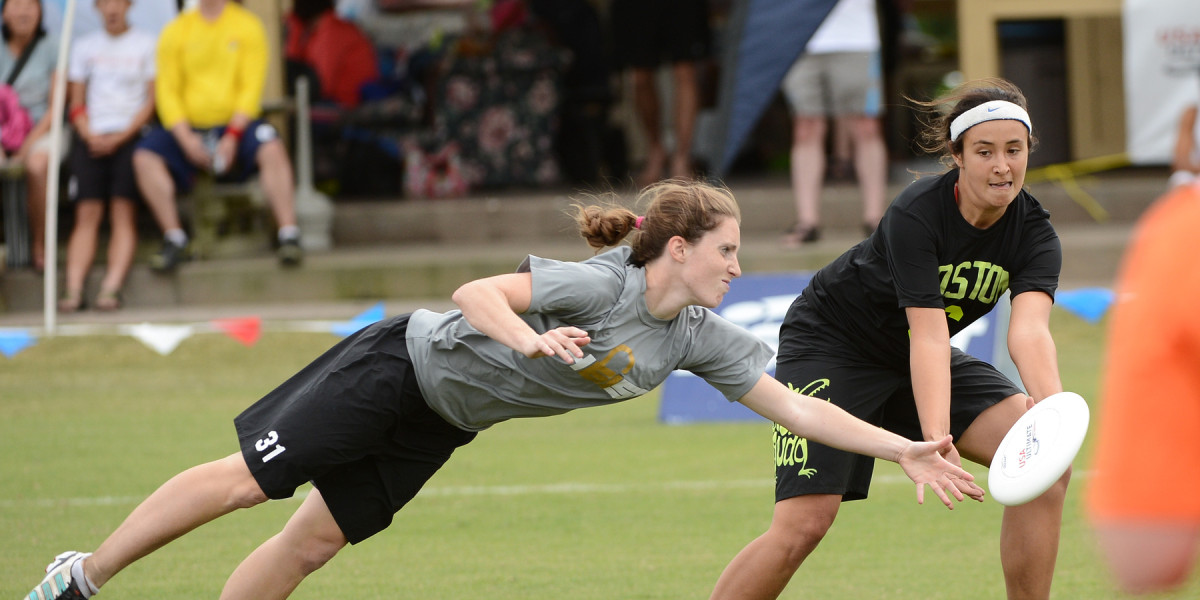 UltiPhotos.com)" />
Madison's Sara Scott with a layout block. (Kevin Leclaire - UltiPhotos.com)
UltiPhotos.com)" />
Madison's Sara Scott with a layout block. (Kevin Leclaire - UltiPhotos.com)
This column made possible by SkydFund 2015 and your generous support!
At WUCC in Lecco, I had what ended up being a defining conversation of my 2015 college coaching season. Jay Drescher, a Drag’n Thrust teammate, is a kindred spirit. We’re similar in how we work, how we play, and how we carry ourselves. As we spoke, we outlined what we bring to our team and how it translates to how we carry ourselves on the field. I referred to my intangible quality as “D-Line Swag” because any offensive firepower or spark I have is fueled by my defensive mindset. If I mess up on O, I gain my confidence back by playing D. All my swagger comes from my defensive game.
Why is this relevant to coaching? Last season Bella Donna struggled to find their team swagger. I felt like I had to convince them that they were good enough. It was like they didn’t believe they could ball like the other great teams we matched up against. I caught glimpses throughout the year—at Centex against Texas, in Regionals against Iowa State—but by the time it seemed like they finally believed in what they brought to the table, the season was over.
This season, the team is even younger than last year, and my love for them is growing by the second. I want all of these women to become great players like the club studs that I admire. It seems all these great players understand their weaknesses, strengths and own them when it comes to game time. I feel a responsibility to help show the members of Bella Donna that each of them has their own version of “D-Line Swag,” and this fits into this greater team identity they are forming.
Other teams seem to have the opposite problem: they have way too much confidence that they lose the drive to work hard, developing a sense of entitlement to win over so-called “lesser opponents.” In all honesty, these issues are related in the sense that you need to have confidence in yourself and teammates, but not morph into a superiority complex monster. As a leader the struggle is how to lead your team while maintaining that fine line.
Months after my initial conversation with Jay, the topic comes up more times than I can count in the Wiseman household. What exactly is “swagger” and how does it differ from other related ideas like arrogance or entitlement, and why does it matter to an ultimate player and team?
To many, swagger can be interpreted as cockiness or a feeling of superiority. Having swagger does not mean that you overlook your opponent. The key is to feel confident in your abilities, put that within the frame of your opponent’s strengths and understand when to use your strengths to help your team. If you do not acknowledge or respect your opponent’s strengths, you will let pride get in the way of your individual and team’s success.
If you want to be the best player you can be on a team, you need to understand what you bring to the table. Over the years, I had the privilege of playing with Sara Scott, who was one of the best teammates I have ever had. Does she know what she brings to the table? Absolutely. She knows she has a powerful, accurate forehand huck. She knows how to get open for an under with a variety of moves and works hard in the weight room to develop explosiveness and power. She keeps a level head and calm composure no matter the score or situation. She’ll call herself as a primary cutter in a pull play; if the throw doesn’t work out, she will try it again with some adjustments without second guessing her abilities if the opportunity arises again.
Does knowing that her throws are dominant make her cocky? No. On the contrary. She respects her opponents and learns their strengths quickly because she does not want to play to them. She understands that her skillset gives her a role on the team, owns it, and does it to the best of her ability. In fact, she is an incredibly humble, hard-working, fantastic teammate. Knowing what her skillset is just makes her an even more valuable asset.
As a team, having a culture that builds from individual swagger is invaluable. When Carleton-Eclipse won the Women’s Division-III College Championship in 2011, they built their whole season around the mantra “Find Your Swagger.” They fostered an environment where everyone could recognize their strengths and place them into appropriate roles that allowed them to flourish. What should be a simple concept really offers a challenge to a lot of teams: Eclipse’s collective success was a reflection of the confidence they felt in themselves and the confidence they felt that every player was in a position to succeed. They had individual swagger and a team culture that embodied all of these personal versions of “D-Line Swag.”
Finding your individual and team swagger is important to your team’s success regardless of the level you and your team are at. Whether your goal is making Regionals, recruiting 10 players, having regular team workouts for the first time, or winning a national championship, figuring out what defines your team’s swagger and wearing it on your sleeve helps to drive your team’s success.
A second part of Robyn’s D-Line Swag series will outline the path to finding your individual and team swagger.









Comments Policy: At Skyd, we value all legitimate contributions to the discussion of ultimate. However, please ensure your input is respectful. Hateful, slanderous, or disrespectful comments will be deleted. For grammatical, factual, and typographic errors, instead of leaving a comment, please e-mail our editors directly at editors [at] skydmagazine.com.